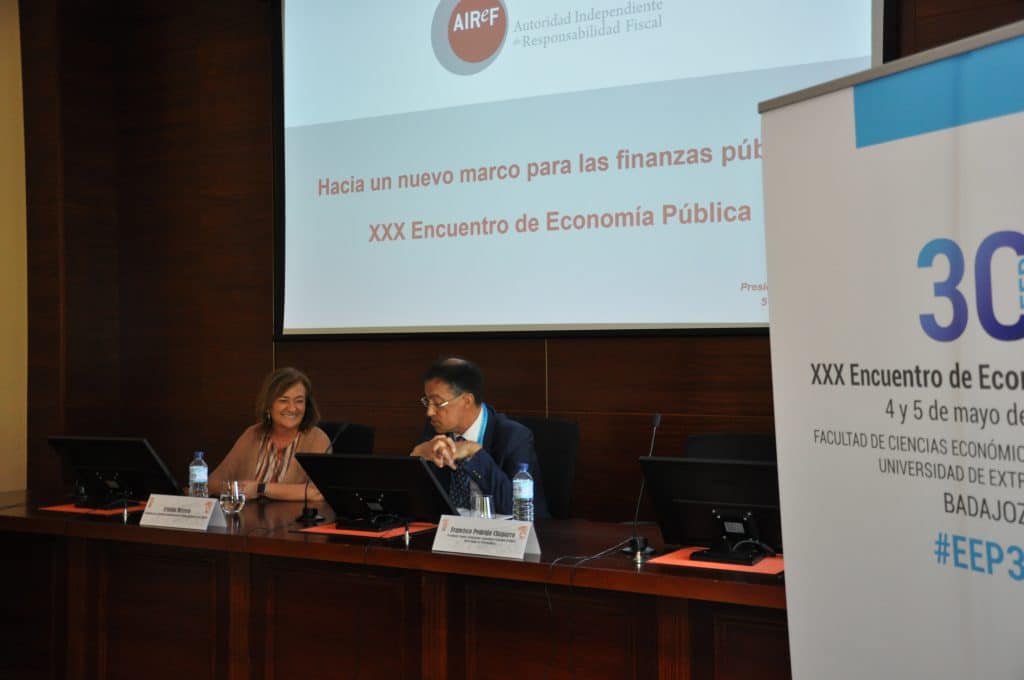
The president of the Independent Authority for Fiscal Responsibility (AIReF), Cristina Herrero, today closed the 30th Public Economics Meeting at the Faculty of Economics and Business Studies of the University of Extremadura. During her speech, she reviewed the new scenario opening up in 2024 for public finances, which requires a strategic vision focused on long-term fiscal sustainability and the quality of public finances to face the changes in the economic, fiscal and institutional context.
The economic backdrop is now more favourable than forecast in the autumn, which is leading to revisions among most analysts. AIReF, for its part, maintains a slightly higher forecast (1.6% for 2023) than the consensus average, although it will update its full macroeconomic picture in the Report on the Stability Programme Update (SPU) scheduled for publication on 11 May.
In the fiscal context, the vulnerability of public finances stands out, given the large and persistent fiscal imbalance and the high level of debt. The public deficit has been heavily conditioned in recent years by anti-crisis measures, the cost of which has mainly been absorbed by Central Government. However, AIReF’s president also warned of the increase in structural spending in the Regional Governments, largely not associated with COVID, and which could be amplified by the additional, albeit temporary, resources from the financing system. With this outlook, AIReF’s forecasts point to an exhaustion of debt reduction in the medium term, which will stabilise at levels above 100% of GDP from 2026 onwards, well above the 60% target.
And in the institutional context, 2024 will be the year of the return to fiscal rules with a new fiscal governance framework. In this regard, Cristina Herrero pointed out that the Commission’s proposal moves towards a framework that is more adapted to national characteristics and a strengthening of the Independent Fiscal Institutions (IFIs) such as AIReF, which is essential in countries as decentralised as Spain.
In view of these changes, Cristina Herrero stressed the need for a strategic vision focused on long-term fiscal sustainability and the quality of public finances. In March this year AIReF issued its first Opinion on the long-term sustainability of public administrations, with updated demographic projections and a hypothetical baseline scenario without fiscal rules and without any economic policy reaction in which ageing could take public debt to 186% of GDP in 2070 and the deficit to 7% of GDP that same year.
Pension spending would start to accelerate especially from 2035 onwards, peaking at 16.3% of GDP in 2049. Health spending would stabilise at around 8.4% of GDP from 2049 onwards, while long-term care spending would stabilise at around 2% around 2060. In contrast, spending on education would fall to 3.6% in 2041 and return to 4.2% of GDP in 2070. To illustrate the uncertainty of these projections, AIReF also puts forward three alternative scenarios with higher potential growth, a new fiscal framework and discretionary changes in revenue and expenditure.
On the need to pay attention to the quality of public finances, Cristina Herrero highlighted AIReF’s public policy assessment work, which is backed by the European Commission. The institution is currently completing the third and final phase of the first Spending Review, starting work on the first phase of the second Spending Review and carrying out other assignments from both the Central Government and the Autonomous Regions. In fact, a total of 11 regions have already commissioned different assessments from AIReF.
Cristina Herrero stressed the importance of this type of exercise with an evidence-based methodological approach and intensive use of data. Furthermore, AIReF’s assessments are intended to be useful for decision-making by putting findings and proposals on the table based on the analyses carried out. In this respect, in the first quarter of this year AIReF launched an Observatory of assessment findings and proposals, an interactive tool that makes it easier to consult.
She gave as an example the assessment of the Minimum Living Income (MIV), published in July 2022. In that analysis AIReF concluded that the MVI had the potential to become a more powerful instrument in the fight against poverty and social exclusion and it put forward various proposals such as investigating the causes of the ‘non take up’ phenomenon (whereby potential beneficiaries do not apply for the benefit), analysing rejected applications and making the objectives of the policy more specific, among other proposals. This year AIReF will update and expand on that Opinion.





